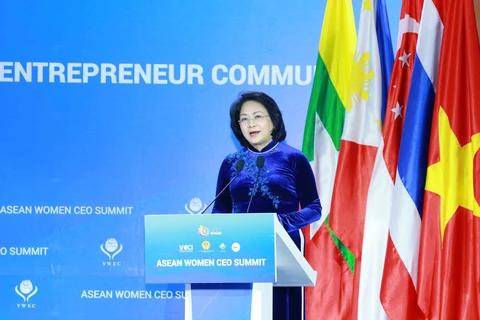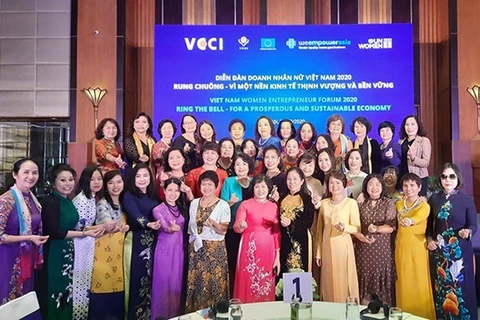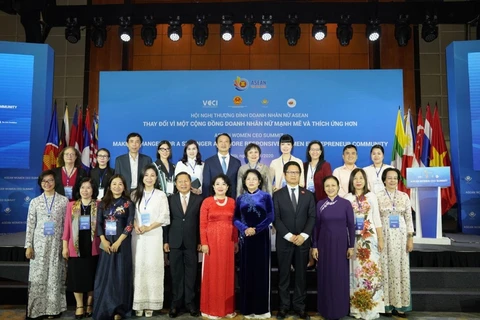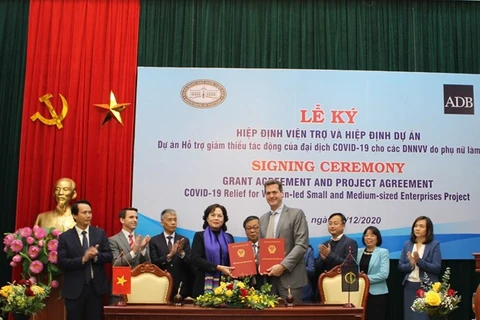Hanoi (VNS/VNA) - Vietnam has seen sharp growth in the number of businesses run by women, the Vietnam Chamber of Commerce and Industry has said.
As of September 2019, 24 percent of businesses in the country were owned by women, the highest percentage in Southeast Asia.
Phung Minh Thuy, deputy business director and co-founder of HMGpop said: “With their, detail-oriented work culture and ability to understand the market, women have an advantage when it comes to working in a competitive industry.”
Yet they face challenges like gender stereotyping and society’s expectation of balancing work and family, she said.
“Entrepreneurship has never been easy, especially for women.”
Businesswomen have therefore kept seeking new methods to overcome these challenges, and e-commerce, including across borders, has come as a boon for them.
Thuy said she and her husband started with an architecture firm and gained lessons through failures.
In 2012, when the property market suffered a downfall, she decided to invest in designing and making 3D pop-up cards and promoting them on e-commerce websites.
Realising their growth potential since many cultures have a gifting custom, she decided to choose Amazon to introduce her products to global customers.
“To get Amazon to accept HMGpop, I spent some time to become familiar with how to manage a business on Amazon, such as how to optimise product listings,” she said.
Now her products get overwhelming support from customers around the world, and are in top position in the card category with up to 1,300 orders per day.
In 2019-20, her business saw 100 percent growth on Amazon, and revenues from the marketplace now account for 30 percent of the company’s total sales.
Tanisa, a Tay Ninh province speciality and rice product manufacturer and exporter, is another example.
Tran Hanh Thu, its CEO, said Vietnamese food, with its unique taste and health benefits, has always been popular world-wide but did not manage to make a mark unlike Japan’s sushi or Korea’s kimchi. Besides, Vietnamese products are often sold as coming from other Asian countries.
This was a key motivation for Thu to aspire to sell made-in-Vietnam products to global customers and decided to take the Amazon route.
“Though B2B export can help increase revenues, it does not ensure that SMEs like Tanisa can achieve their branding goals. Meanwhile, Amazon has not only enabled us to promote Tanisa’s products as 100 percent ‘made-in-Vietnam’ but has also created a ‘flat world’ in which Tanisa’s products can reach international customers directly from the manufacturers in Vietnam. So far, my experience has been very pleasant.”
HMGpop and Tanisa are only two of a large number of successful women-owned enterprises.
Last December, Amazon launched Vietnamese language support to help sellers start a digital business and maintain their competitiveness by sharing resources in the local language.
Thuy said: “Equal opportunity in business is like having the same starting point. To succeed and become a leader, you should choose products with competitive advantages.”/.
As of September 2019, 24 percent of businesses in the country were owned by women, the highest percentage in Southeast Asia.
Phung Minh Thuy, deputy business director and co-founder of HMGpop said: “With their, detail-oriented work culture and ability to understand the market, women have an advantage when it comes to working in a competitive industry.”
Yet they face challenges like gender stereotyping and society’s expectation of balancing work and family, she said.
“Entrepreneurship has never been easy, especially for women.”
Businesswomen have therefore kept seeking new methods to overcome these challenges, and e-commerce, including across borders, has come as a boon for them.
Thuy said she and her husband started with an architecture firm and gained lessons through failures.
In 2012, when the property market suffered a downfall, she decided to invest in designing and making 3D pop-up cards and promoting them on e-commerce websites.
Realising their growth potential since many cultures have a gifting custom, she decided to choose Amazon to introduce her products to global customers.
“To get Amazon to accept HMGpop, I spent some time to become familiar with how to manage a business on Amazon, such as how to optimise product listings,” she said.
Now her products get overwhelming support from customers around the world, and are in top position in the card category with up to 1,300 orders per day.
In 2019-20, her business saw 100 percent growth on Amazon, and revenues from the marketplace now account for 30 percent of the company’s total sales.
Tanisa, a Tay Ninh province speciality and rice product manufacturer and exporter, is another example.
Tran Hanh Thu, its CEO, said Vietnamese food, with its unique taste and health benefits, has always been popular world-wide but did not manage to make a mark unlike Japan’s sushi or Korea’s kimchi. Besides, Vietnamese products are often sold as coming from other Asian countries.
This was a key motivation for Thu to aspire to sell made-in-Vietnam products to global customers and decided to take the Amazon route.
“Though B2B export can help increase revenues, it does not ensure that SMEs like Tanisa can achieve their branding goals. Meanwhile, Amazon has not only enabled us to promote Tanisa’s products as 100 percent ‘made-in-Vietnam’ but has also created a ‘flat world’ in which Tanisa’s products can reach international customers directly from the manufacturers in Vietnam. So far, my experience has been very pleasant.”
HMGpop and Tanisa are only two of a large number of successful women-owned enterprises.
Last December, Amazon launched Vietnamese language support to help sellers start a digital business and maintain their competitiveness by sharing resources in the local language.
Thuy said: “Equal opportunity in business is like having the same starting point. To succeed and become a leader, you should choose products with competitive advantages.”/.
VNA
























